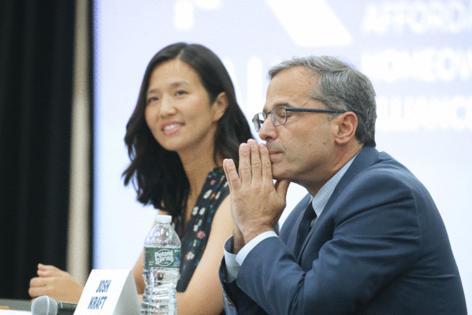Boston mayor, City Council races on the ballot in Tuesday's preliminary election
Published in News & Features
BOSTON — Voters will head to the polls in Boston Tuesday to cast their ballots in a closely watched preliminary election, which features mayoral and city council races and is the first test for the city after last fall’s disastrous ballot shortage.
The City of Boston will manage the preliminary election, but with increased oversight from Secretary of State Bill Galvin’s office.
Galvin placed the Boston Elections Department in receivership in February, after widespread ballot shortages at polling places in last fall’s state and presidential elections left voters waiting for hours for a restock, and in some cases, leaving voters unable to return to vote after ballots were rushed there by police.
The stakes are high again for the city’s preliminary election, which features a closely watched mayoral race, albeit one that, if polling is taken as a key indicator, Mayor Michelle Wu is comfortably leading over her top challenger Josh Kraft, a son of the billionaire New England Patriots owner Robert Kraft and longtime philanthropist.
An Emerson poll released last week showed Wu holds a 50-point lead over Kraft, meaning that while the winner of Tuesday’s primary may not be in doubt, what remains to be seen is how large Wu’s potential margin of victory is over her top challenger.
Wu and Kraft are both Democrats and widely expected to advance to the November general election. Kraft has told reporters at recent press events that he would consider a 15-point or less defeat to be a win.
The preliminary will narrow down the field of four mayoral candidates to two. Also running are community activist and former city employee Domingos DaRosa and perennial candidate and former school committee member Robert Cappucci.
Other races to watch are the at-large City Council race, where former longtime Dorchester-centric District 3 Councilor Frank Baker — a rare conservative voice on prior iterations of the Council — is trying to knock off one of the four incumbents in his first citywide bid for office, and District 7 councilor.
The District 7 seat has been vacant since Tania Fernandes Anderson resigned in early July after her conviction on federal corruption charges in May. Fernandes Anderson was sentenced to one month in prison in federal court last Friday. Eleven candidates are running for District 7, in the primary’s most crowded race. Only two will advance to the November general election.
The four at-large incumbents, Council President Ruthzee Louijeune, Erin Murphy, Julia Mejia and Henry Santana, are all running for reelection. Louijeune, a progressive Democrat, topped the ticket in the municipal election two years ago, with Murphy, a moderate Democrat, coming in a close second.
Progressives Mejia and Santana, a first-term councilor, finished third and fourth respectively, and are seen by some political observers as more vulnerable in the race than their colleagues. Santana, a close ally of the mayor, has been cited by observers as the most at risk of being knocked off in the at-large race.
Wu had to mobilize her campaign in an “all-hands-on-deck” effort to get Santana onto the ballot after he failed to garner enough signatures on his own. By comparison, the three other at-large incumbents not only gathered enough signatures on their own, but had maxed out their signatures ahead of the deadline.
While Baker’s bid has caused the most buzz, other challengers who have garnered attention include Wu administration employee Alexandra Valdez, Boston Water and Sewer Commission and former City Hall employee Will Onuoha, and Marine veteran and small business owner Marvin Mathelier.
Also running are Republican Rachel Nicole Miselman and Yves Mary Jean, who per his campaign website, describes himself as a Haitian poet who is not a political insider.
The top eight vote-getters will move on to the November election. Along with eliminating two candidates, the preliminary may provide a clearer glimpse of where the four incumbents and their challengers stand in the race.
For District 7, the 11 candidates running include Mavrick Afonso, who works in the Healey administration’s Executive Office of Housing and Livable Communities; Said Ahmed, a longtime Boston Public Schools educator and coach who founded the Boston United Track and Cross Country program; and Said Abdikarim, who has a background in nonprofit leadership and was endorsed by ex-District 7 Councilor Tania Fernandes Anderson days before her sentencing.
Also running are Miniard Culpepper, senior pastor of the Pleasant Hill Missionary Baptist Church; Jerome King, who ran for the D7 seat and was endorsed by the Herald in 2023; Samuel Hurtado, former chief of staff to then-D7 Councilor Kim Janey; perennial candidate Roy Owens Sr.; Wu critic Shawn Nelson; formerly incarcerated person Wawa Bell; private sector employee Natalie Juba-Sutherland; and Tchad Akilah Cort.
Four other district races are on the preliminary ballot. Of the three candidates running in each race, two will move on to the Nov. 4 general election.
In District 1, Councilor Gabriela Coletta Zapata is challenged by Andretti Stanziani, a former State House employee who qualified for the ballot but later opted against actively campaigning, and Ricardo Rodriguez.
District 2 Councilor and former City Council President Ed Flynn faces a challenge from Brian Foley and Charles Delaney.
In District 4, Council Vice President Brian Worrell has two challengers: Helen Cameron and Juwan Skeens.
District 5 Councilor Enrique Pepén faces Winston Pierre and Sharon Hinton in his bid for a second term.
District 6 Councilor Benjamin Weber has just one challenger, Steven Berry, meaning both will automatically move on to the general election. District 3 and 8 Councilors John FitzGerald and Sharon Durkan are running unopposed.
_____
©2025 MediaNews Group, Inc. Visit at bostonherald.com. Distributed by Tribune Content Agency, LLC.







Comments